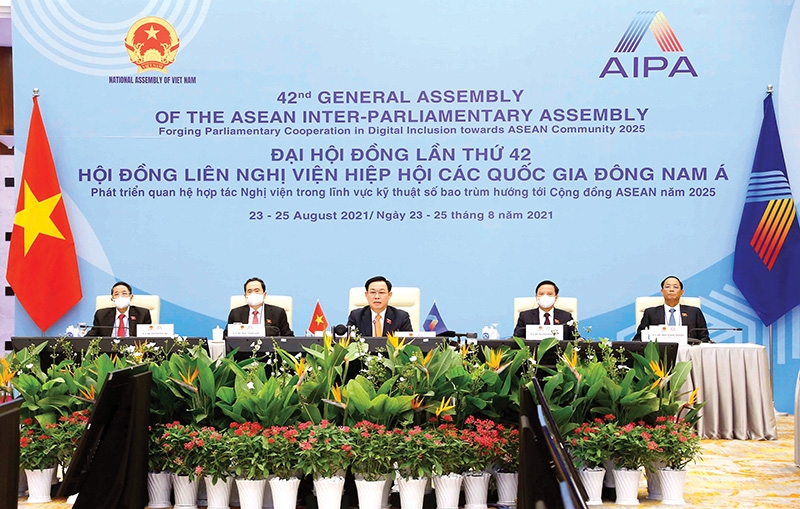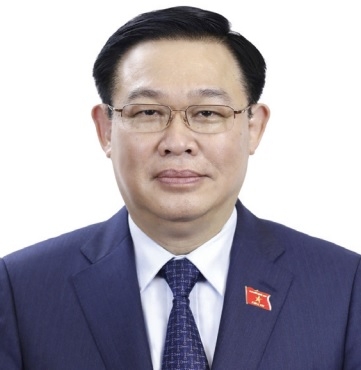Digital future front and centre for ASEAN
 |
| National Assembly Chairman Vuong Dinh Hue delivered a speech at the first plenary session of AIPA-42. Photo: VNA |
After more than 18 months of economic and social woes in ASEAN, member states have been discussing possibilities for the regional economy to bounce back strongly.
At last week’s 42nd General Assembly of the ASEAN Inter-Parliamentary Assembly, State President Nguyen Xuan Phuc stated that in the context of COVID-19 and Industry 4.0, every step of the development of the ASEAN Community cannot be realised without the important role of the legislative channel, represented by AIPA and member parliaments.
The event was hosted via video teleconference by Brunei under the theme of forging parliamentary cooperation in digital inclusion towards the ASEAN Community in 2025. The theme outlines the need to further build on the vital role of AIPA and its member parliaments in accelerating digitalisation, ensuring stable growth and fostering the sustainable recovery of ASEAN.
“I highly appreciated the theme as it poses practical requirements in ASEAN parliamentary cooperation, promoting the role of the legislative channel in aiding digital transformation, building a digital economy, and narrowing the digital divide and digital inequality,” President Phuc stated.
One of the noted solutions is application of digital technology and usage of new achievements of Industry 4.0 which, according to experts, refers to a set of highly disruptive technologies, such as AI, robotics, blockchain, and 3D printing that are transforming social, economic, and political systems and placing pressure on leaders and policymakers to respond.
With its great potential in IT and digital transformation, Vietnam is sharing experiences and also learning experiences from other regional nations to develop itself into a veritable digital economy and to develop ASEAN as a major digital economy. This will help the bloc address emerging challenges. For example, Vietnam is seeking experiences from Indonesia and Singapore in digitalisation and how to enact relevant policies.
In 2017, Indonesia began to make itself 4.0 in order to turn itself into one of the 10 biggest economies globally by 2030. Its government has selected five key sectors for the initial adoption of Industry 4.0, including food and beverages, garments and textiles, vehicles, chemicals, and electronics.
“These sectors would need a high digitalisation level and they are the biggest contributors of Indonesia’s economy,” said former Indonesian Ambassador to Vietnam Ibnu Hadi.
Currently Southeast Asia has 11 enterprises with over $1 billion in valuation, such as Gojek, Traveloka, Lazada, Grab, Razer, VNPay, and VNG. However, four come from Indonesia while Vietnam only has two, namely game developer VNG and payment firm VNPay.
International ovation
Vietnam’s efforts to develop pro-business e-government and a digital economy have received applause from the international community, especially amid a surge in COVID-19 hurting economic growth.
Under the UN Department of Economic and Social Affairs’ e-government survey last year, Vietnam climbed two places to rank 86 out of 193 countries. With this ranking, Vietnam has maintained its record of consecutive increases since 2014, climbing from 99 to 86 in the process.
Harvesting 0.6667 points in the survey’s E-Government Development Index (EGDI), Vietnam is among the developing countries with a high index, a score which is higher than the global EGDI average of 0.5988 points, the Asian average of 0.6373 points, and the Southeast Asian average of 0.6321 points.
In Southeast Asia, Vietnam has successfully kept a similar position as it did in 2018, ranking sixth among 11 countries. “The tax authority in Vietnam has implemented e-fling, e-payment, and e-customs initiatives that have helped to improve tax collection and management and have lowered taxpayers’ compliance costs,” the survey report cited.
Commenting on efforts to develop a digital economy, Minister of Foreign Affairs Bui Thanh Son said, “Vietnam is striving for sustainable growth on the basis of improving the quality of growth and taking advantage of the opportunities of the Industry 4.0 to raise its labour productivity and competitiveness to move up the ladder in the global value chain.”
In Vietnam, about 60 per cent of the 98 million population are under 35 years of age. They have quick access to new technology and about 55 per cent of the population use the internet, he added.
| Vuong Dinh Hue Chairman, National Assembly
AIPA member parliaments need to complete the legal framework and remove barriers to facilitate the implementation of digital transformation policies, with a view to building the e-government towards a digital government. It is also necessary to improve the quality of online public services of our governments and parliaments, facilitate equitable access to digital services for the people and businesses, increase digital literacy for the vulnerable groups, offer fair, equitable and affordable digital services, and promote the development of a digital economy and society. Moreover, we need to encourage the governments of ASEAN members to carry out concrete programmes pertaining to digital development. It is also essential to bolster cooperation with partners and international organisations to improve digital infrastructure, ensure an inclusive digital ecosystem, and narrow the digital gap. I request AIPA to actively lend its assistance to the governments of ASEAN countries in accelerating the implementation of measures to boost digital connectivity and digital literacy in less-developed areas. In addition, we need to mobilise social resources to develop a digital ecosystem via public-private partnerships and create incubators to develop digital corporations and start-ups. In particular, it is necessary to align the ASEAN Comprehensive Recovery Framework with the plans of each country to assist their enterprises in enhancing innovation and expediting digitalisation. We need to improve policies and support initiatives in the cooperation within ASEAN and between the bloc and its partners on cybersecurity, information privacy, data protection, and confidence-building in the digital sphere. Advanced digital infrastructure and necessary confidence in this field will pave the way for the sustainable development of ASEAN countries. In the face of the current complicated developments of the pandemic, I call for the solidarity and common responsibility of AIPA in cooperation and experience sharing, especially in the application of science and technology to effectively control it. I propose that we need to strengthen cooperation within the bloc and with partners in research, development, and fair sharing of vaccines, drugs, and equipment for COVID-19 prevention and fight. |
Promoting digitalisation
More than ever, the COVID-19 pandemic has underscored the urgency across the board pertaining to state governance and adjustments of policies and development goals. It has also emphasised the demand for digitalisation and the building of a digital economy, so as to timely respond to the pandemic and sustain socioeconomic development.
COVID-19 also constitutes a catalyst for ASEAN’s endeavours to accelerate the digitalisation of its economy. According to the World Economic Forum, ASEAN is the fastest-growing internet market in the world. With 125,000 new users of the internet every day, the ASEAN digital economy is projected to grow significantly, adding an estimated $1 trillion to regional GDP over the next 10 years.
Vietnam suggested a number of priorities for ASEAN nations to grab opportunities from Industry 4.0. The priorities include the regional harmonisation of e-platforms on connectivity in finance and banking, marketing, communications, and logistics.
It has also suggested the establishment of a mechanism for harmonising the business climate, legal system, and regulations among ASEAN member states. This will help regional enterprises to improve their global competitiveness.
Envisioning a future defined by Industry 4.0, Vietnamese Minister of Information and Communications Nguyen Manh Hung also underlined the need of ASEAN nations for “smart governance” and the willingness of governments, businesses, and societies to collectively adapt to rapid technological change.
“Technology can change very fast but the people, governments cannot change so fast and this will be our biggest challenge. So what do we need to do?” he said. “We have to train people so they are adept at changes, not only technological training but soft skills too. Industry 4.0 is more about a mindset revolution.”
The bloc is now jointly boosting the implementation of some new initiatives that Vietnam advanced three years ago in Hanoi, including a “pan-ASEAN roaming charge for mobile phones” initiative, a cybersecurity intelligence cooperation initiative, and an initiative on training high-quality IT human resources.
In Vietnam, there are four big mobile network operators. Of these, Viettel subscribers can roam to 213 countries and 524 carriers, and Vinaphone to 180 countries and 466 carriers. The Ministry of Information and Communications’ Department of International Cooperation notes that Viettel has already applied the same charges for all calls, messages, and data among Viettel (in Vietnam), Metfone (in Cambodia), Unitel (in Laos), and Mytel (in Myanmar).
“Lowering international mobile roaming charges in ASEAN is a sure trend to boost the demand of customers and compete against other services like local SIMs and Wi-Fi, as well as towards ‘flat’ telecommunications in ASEAN,” said a representative from the department.
Vietnam also proposed the establishment and connectivity of innovative incubators. “In the Industry 4.0 context, many ASEAN nations have their own national-level innovation hubs and incubators. And I suggest the construction of a framework on connecting these incubators into a regional-level incubator,” President Phuc stated.
What the stars mean:
★ Poor ★ ★ Promising ★★★ Good ★★★★ Very good ★★★★★ Exceptional
Related Contents
Latest News
More News
- Spring Fair 2026 boosts domestic demand (March 02, 2026 | 16:30)
- Law on Investment takes effect (March 02, 2026 | 16:21)
- Ho Chi Minh City attracts nearly $980 million in FDI in early 2026 (March 02, 2026 | 10:57)
- Businesses bouncing back after turbulent year (February 27, 2026 | 16:42)
- VinaCapital launches Vietnam's first two strategic-beta ETFs (February 26, 2026 | 09:00)
- PM sets five key tasks to accelerate sci-tech development (February 26, 2026 | 08:00)
- PM outlines new tasks for healthcare sector (February 25, 2026 | 16:00)
- Citi report finds global trade transformed by tariffs and AI (February 25, 2026 | 10:49)
- Vietnam sets ambitious dairy growth targets (February 24, 2026 | 18:00)
- Vietnam, New Zealand seek level-up in ties (February 19, 2026 | 18:06)


 Tag:
Tag:




















 Mobile Version
Mobile Version